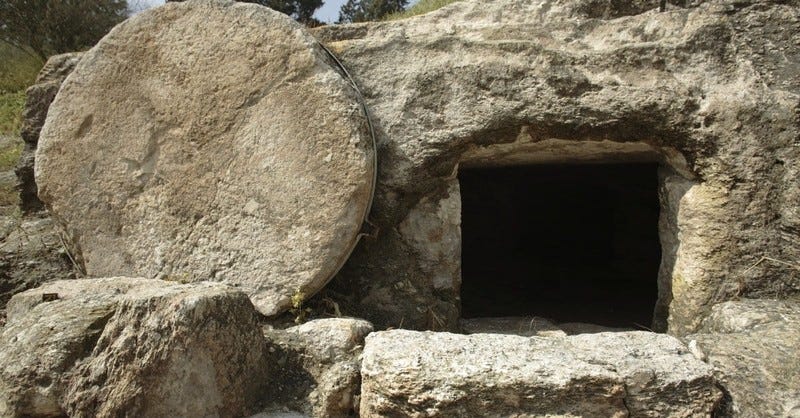What do a bunny, some eggs, and a rolling stone have in common?
They share one Sunday each Spring
One Sunday each Spring, children awaken to search for colorful eggs filled with candy left behind by a benevolent bunny. That same day, for millennia, a rolling stone has been celebrated by millions around the world (no, not Keith Richards). This is where the similarity ends. The bunny is fictional, though a fun fable for children, as is the ensuing sugar rush after his departure. The rolling stone, however, is real. It is a stone that was rolled away from the mouth of a cave - a cave that served as the tomb in which was laid the body of Jesus after He died a gruesome death on a cross.
Since at least the 1600s, this special day has been called Easter. The origin of that word and its use in reference to the day is questionable. Some say it comes from the name of the Sumerian goddess of fertility, Ishtar, which could explain the use of eggs in celebrating the holiday, as they often serve as a symbol of fertility. There is another fertility goddess from whose name Easter also may have come, the Celtic goddess Oestre. Another possible forerunner is the Germanic Spring goddess Ēostre (whose name in Old English was Ēastre). Most of these have (allegedly) been debunked.
Another proposed beginning for the use of the word has Germanic origin. This theory asserts that the designation of Easter week in Latin as in albis (the plural of the Latin alba, meaning “dawn”) became eostarum in old German, and this became the basis for the Old English leading to Easter. This is the most likely source of the word.
That said, there are a number of other proposed origins, and frankly, none of them matter. What is truly important is that on this day, we celebrate the rolling away of the stone used to seal that ancient tomb.
In the King James version of the Bible, in the recounting of Herod persecuting Christians, we read the following about his plans for the apostle Peter: “And when he had apprehended him, he put him in prison, and delivered him to four quaternions of soldiers to keep him; intending after Easter to bring him forth to the people” (Acts 12:4). The word here translated “Easter” is the Greek word Πάσχα (Pascha), the equivalent of the Hebrew פֶּ֥סַח (Pesach), which means “Passover.” In the King James version, Pascha is actually translated “Passover” everywhere else it appears in the New Testament. In other translations, it is rendered “Passover” in Acts 12:4 as well.
What is my point in all this? Pointing to the sacrifice of the Passover lamb, something that is too often lost in our use of the word Easter and in the appearance of an egg-bearing bunny. As a matter of fact, if we want to get truly OCD about the day, based on Scripture, it should be celebrated the Sunday immediately following the Jewish Passover, as this would align with the biblical account. But back to the terminology, “Easter” does not, for modern English-speakers, in any way express that which we celebrate.
Jesus was hung on a cross at the Passover, then after His death, was taken down and laid in the tomb over the entrance of which a large stone was placed. Sunday morning, the stone was rolled away, and His followers found the tomb empty. Instead, they experienced an angelic appearance and were told that He would not be found among the dead, for He had risen. This is what we celebrate - the resurrection of Jesus, His overcoming death, because it was Jesus “who was delivered over because of our transgressions, and was raised because of our justification” (Rom. 4:25).
That’s right. This man Jesus was sacrificed as a lamb at the Passover, much like the Hebrews in ancient Egypt were instructed by God to sacrifice lambs at the original Passover, that the angel of death might pass over their homes. As Paul states, “for Christ our Passover also has been sacrificed” (1 Cor. 5:7b). Peter reminds us that this is how we are redeemed:
If you address as Father the One who impartially judges according to each one’s work, conduct yourselves in fear during the time of your stay on earth; knowing that you were not redeemed with perishable things like silver or gold from your futile way of life inherited from your forefathers, but with precious blood, as of a lamb unblemished and spotless, the blood of Christ. - 1 Pet. 1:17-19
This day, this Resurrection Day, is truly a day to celebrate. It is not about a hypothetical hare hopping around stashing sweet-filled shells - it is about salvation, salvation we do not deserve, but which God gives freely. For this reason, to those who believe, I joyfully say, “He is risen!” To those who do not believe, I also joyfully say, “He is risen!” This salvation is offered freely, but it is received only through faith. As the apostle Paul wrote, “if you confess with your mouth that Jesus is Lord and believe in your heart that God raised him from the dead, you will be saved. For with the heart one believes and is justified, and with the mouth one confesses and is saved.” (Rom 10:9-10).
Happy Resurrection Day!





A little food for thought, or maybe a riddle to ponder. Why is it that Jesus focused on the bread and the cup / wine instead of the "passover lamb" during the Last Supper aka Passover meal? It seems that the sacrificial Lamb would make for a more succinct "object lesson" as opposed to the cup. One of the many things I have pondered and meditated upon over the past several weeks leading up to Passover week and this Ressurection weekend. Everything Jesus said and did was deliberate and with a purpose. Have a blessed weekend and remember, the tomb is empty and Jesus is indeed alive and calls out to all to commune with Him.
The OVER-commercialization of Christian HOLYdays turned me off from a number of things done in the name of celebrating a specific event, like Easter and Christmas. Magic bunnies and fat jolly men in flannel are NOT the focus of these days
But, those looking to cash in on those days will do everything they can to convince you that they are right and you should celebrate the way they prescribe.
My family got away from the commercial, false, festivities many years ago. Watching people literally FIGHT each other over TOYS for their spoiled little brat kids was the final straw. You can't GET ANY farther from the TRUE "reason for the season" than GROWN ADULTS fighting over a stinking doll.
They sing of PEACE on Earth and GOODWILL towards all, then trun around and suckerpunch the person that got between them and the THING they desire (which is not to know their Lord and Savior).
I have seen over the past 5 years or so a shift of people who are like me and so many others I now. They are turning away from the greed and false idols that they have been told are the reason for celebration. They are turning back to the TRUTH of these HOLY days. That Christ lives and is our only way to our Heavenly Father.